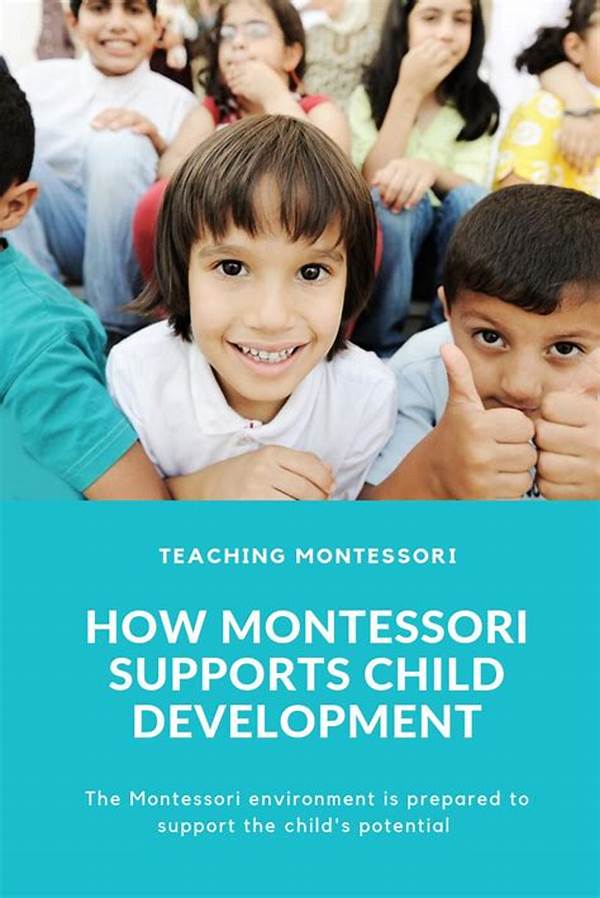In the grand tapestry of human development, emotions play a profound role. The ability to understand and manage one’s feelings is integral to personal and social well-being. Emotional development forms the cornerstone of a happy and successful life, yet it’s often given less attention in traditional educational settings where academe takes the spotlight. Enter the Montessori method, where emotional development holds as much importance as cognitive skills. This method, known for its child-centered approach, has revolutionized the educational landscape by making learning a more holistic experience. If you’re a parent carving out the path for your child or an educator seeking innovative teaching methods, understanding how Montessori supports emotional development could be your key to an enriched educational voyage.
Read More : Apa Itu Montessori School
Imagine an environment where children are not just taught to read and write but also to comprehend their emotions, express them appropriately, and empathize with others. Does it sound idyllic? Well, this is not just a dream but a reality in Montessori settings. Maria Montessori’s pioneering vision introduced educational principles that resonate well with the dynamic facets of emotional growth. These principles are not just words written in an educational doctrine but practices that breathe life into children’s daily experiences in Montessori classrooms. It’s about creating an atmosphere where the mind and heart are nurtured simultaneously, fostering a new generation of emotionally intelligent individuals ready to take on the world with compassion and understanding.
Montessori’s Role in Emotional Development
Montessori classrooms are uniquely designed to support emotional growth. The structure fosters an environment of trust and respect, where students are encouraged to explore their feelings and work through their emotions in positive ways. In this setting, children learn essential life skills such as conflict resolution, active listening, and mutual respect. The freedom to choose activities and work at their own pace allows them to develop self-discipline, confidence, and accountability for their actions. This autonomy and empowerment are critical components of how Montessori supports emotional development.
Emphasis on social interactions provides students with practical situations to practice empathy and cooperation. Group activities and peer learning are integral in helping students understand the dynamics of teamwork and mutual respect. Through these interactions, children naturally develop a sense of community and belonging, which is important for emotional security and growth.
The Montessori method also includes materials and lessons specifically focused on emotions and feelings. Stories, role-play, and guided discussions help children to articulate what they feel and why, enhancing their emotional literacy. This approach lays the foundation for children to grow into adults who can manage their feelings gracefully and engage positively with the world around them.
Lastly, the role of the Montessori teacher is pivotal in emotional development. Unlike traditional educators, Montessori guides observe and facilitate rather than direct, encouraging children to navigate their emotions through reflection and conversation. This mentorship aspect embodies how Montessori supports emotional development by providing stability and guidance in a child’s emotional journey.
Integral Aspects of Montessori Emotional Support
Researchers and educators alike have delved deeply into the Montessori method, uncovering layers of support it provides in emotional development. Their findings consistently highlight a few key pillars that align with emotional growth.
1. Independence and Self-regulation: Montessori encourages self-directed learning, giving children the power to make choices that empower them to regulate their emotions effectively.
2. Freedom with Responsibility: Children develop an understanding of how their actions affect others, promoting empathy and social responsibility.
3. Prepared Environment: The intentional design of a Montessori classroom promotes emotional security, allowing children to feel safe while exploring both their intellect and emotions.
4. Empathetic Peer Interactions: Collaboration is emphasized, fostering interpersonal skills and emotional connections with peers.
5. Child-centered Approach: Personalized learning plans address individual emotional needs, helping each child grow at their own pace emotionally and academically.
In conducting interviews with Montessori educators and observing Montessori classrooms in action, the impact on emotional growth is clear. Parents and educators recount transformative stories showing how Montessori supports emotional development, highlighting children more adept at handling life’s emotional challenges.
As we continue to explore advancements in educational practices, Montessori stands out as a beacon of hope. Its unique perspective and methods embed essential emotional intelligence skills within its curriculum, making it a timeless, transformative approach to education.
With these insights, you are now equipped to make informed decisions about your educational choices, whether to enhance your teaching methodology or steer your child’s educational journey towards a balanced amalgamation of emotional and intellectual development.
—
Emotional Growth through Montessori Practices
1. Empowerment through Choice: Children develop self-esteem by making educational choices.
2. Conflict Resolution: Students learn to resolve disagreements amicably, promoting emotional maturity.
3. Self-paced Learning: Personal growth timelines respect individual emotional and intellectual differences.
4. Role Modeling by Educators: Teachers exemplify emotional intelligence, setting standards for students.
5. Mindful Materials: Lessons incorporate emotional literacy, helping children to articulate and manage feelings.
6. Community Building: Group activities enhance social cohesion and emotional safety.
7. Observation and Guidance: Teachers intervene gently, helping children reflect and learn about their emotions.
The effectiveness of Montessori’s approach in emotional growth is well-documented through countless narratives from educators and parents. The holistic integration within Montessori’s framework allows children to not only excel academically but also become emotionally intelligent individuals, ready to face the complex challenges of the world. This method ensures a nurturing environment that respects and celebrates the emotional journey of every child. As we grapple with fast-paced lifestyles and diverse challenges, adopting educational practices that mirror real-life emotional navigation becomes invaluable. Consider Montessori, not just as an educational choice but as an investment in a more emotionally resilient and aware future generation.
